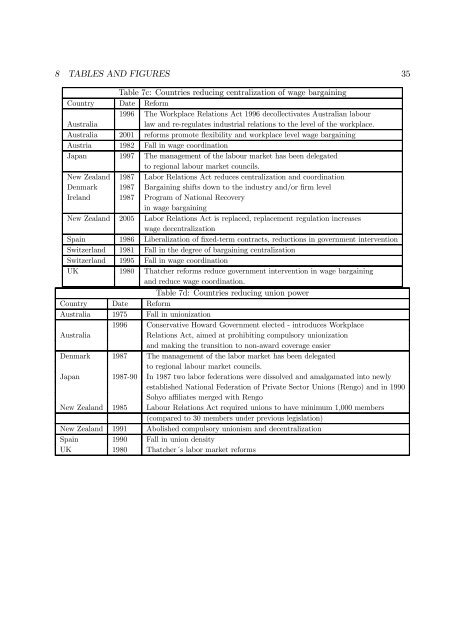Do labor market institutions matter for business cycles?∗ - European ...
Do labor market institutions matter for business cycles?∗ - European ...
Do labor market institutions matter for business cycles?∗ - European ...
Create successful ePaper yourself
Turn your PDF publications into a flip-book with our unique Google optimized e-Paper software.
8 TABLES AND FIGURES 35<br />
Table 7c: Countries reducing centralization of wage bargaining<br />
Country Date Re<strong>for</strong>m<br />
1996 The Workplace Relations Act 1996 decollectivates Australian labour<br />
Australia<br />
law and re-regulates industrial relations to the level of the workplace.<br />
Australia 2001 re<strong>for</strong>ms promote flexibility and workplace level wage bargaining<br />
Austria 1982 Fall in wage coordination<br />
Japan 1997 The management of the labour <strong>market</strong> has been delegated<br />
to regional labour <strong>market</strong> councils.<br />
New Zealand 1987 Labor Relations Act reduces centralization and coordination<br />
Denmark 1987 Bargaining shifts down to the industry and/or firm level<br />
Ireland 1987 Program of National Recovery<br />
in wage bargaining<br />
New Zealand 2005 Labor Relations Act is replaced, replacement regulation increases<br />
wage decentralization<br />
Spain 1986 Liberalization of fixed-term contracts, reductions in government intervention<br />
Switzerland 1981 Fall in the degree of bargaining centralization<br />
Switzerland 1995 Fall in wage coordination<br />
UK 1980 Thatcher re<strong>for</strong>ms reduce government intervention in wage bargaining<br />
and reduce wage coordination.<br />
Table 7d: Countries reducing union power<br />
Country Date Re<strong>for</strong>m<br />
Australia 1975 Fall in unionization<br />
1996 Conservative Howard Government elected - introduces Workplace<br />
Australia<br />
Relations Act, aimed at prohibiting compulsory unionization<br />
and making the transition to non-award coverage easier<br />
Denmark 1987 The management of the <strong>labor</strong> <strong>market</strong> has been delegated<br />
to regional labour <strong>market</strong> councils.<br />
Japan 1987-90 In 1987 two <strong>labor</strong> federations were dissolved and amalgamated into newly<br />
established National Federation of Private Sector Unions (Rengo) and in 1990<br />
Sohyo affiliates merged with Rengo<br />
New Zealand 1985 Labour Relations Act required unions to have minimum 1,000 members<br />
(compared to 30 members under previous legislation)<br />
New Zealand 1991 Abolished compulsory unionism and decentralization<br />
Spain 1990 Fall in union density<br />
UK 1980 Thatcher´s <strong>labor</strong> <strong>market</strong> re<strong>for</strong>ms
















